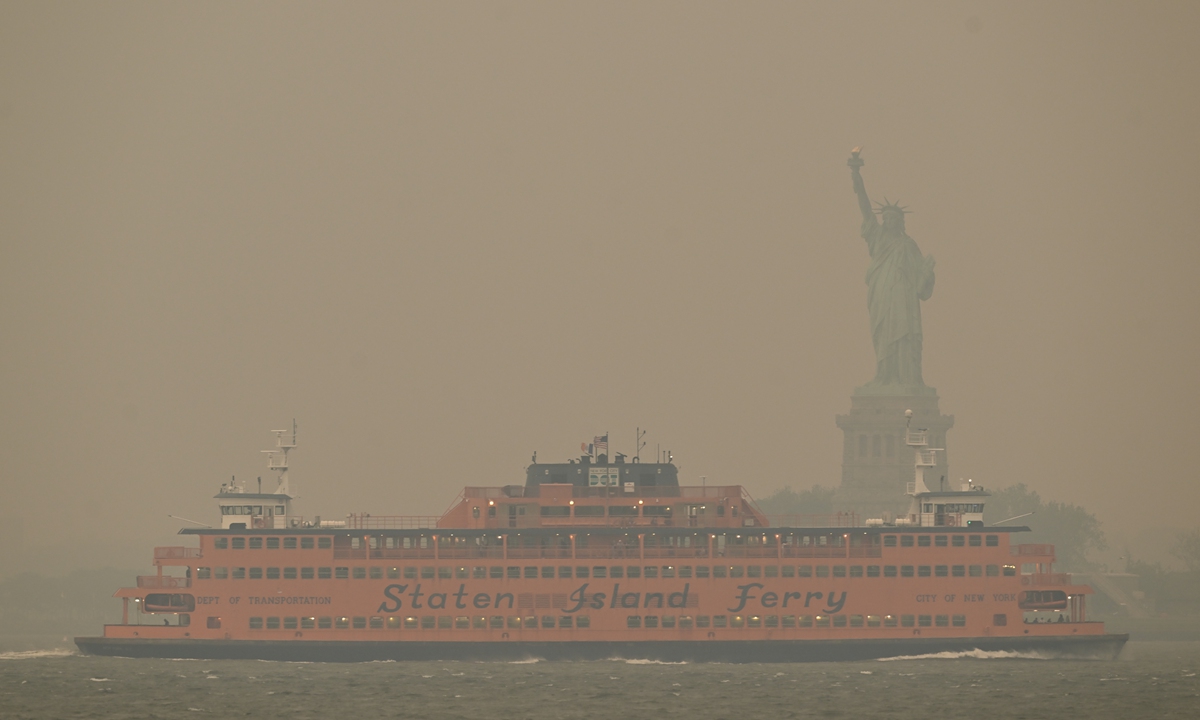
The Downtown Manhattan skyline stands shrouded in a reddish haze as a result of Canadian wildfires on June 06, 2023 in New York City. Photo: AFP
Due to the continuous southward spread of Canadian wildfire smoke, some areas in the eastern US were shrouded in "orange haze" on June 7. On that day, New York City (NYC) became the city with the worst air pollution in the world.This is the worst air quality record since the US Environmental Protection Agency began recording air quality in 1999, and more than 100 million people across the US have been affected by air quality alerts.
Many netizens have described the weather in NYC with a sense of "the end of the world." On social media, a Chinese student studying and living in NYC posted that "It's the first time I've seen so many people wearing masks on the road. I didn't expect the N95 purchased during the COVD-19 pandemic to be put to use again."
The smoke that pervades these areas contains extremely small particles that can penetrate deep into lung tissue and enter the bloodstream, causing diseases such as asthma and heart disease. Considering the above health effects, various institutions including schools have canceled outdoor activities.
Wang Yuanfeng, director of the Carbon Neutrality Technology and Strategy Research Center at Beijing Jiaotong University, pointed out that this incident is not only a problem of air pollution in NYC, but it is also closely related to climate change, as climate change has led to wildfires in many places in the US, Canada and Australia. The United Nations (UN) issued a report stating that humanity is facing a triple planetary crisis: climate change, biodiversity loss and pollution. These three issues are interrelated. Therefore, global cooperation is crucial in the field of climate change.
In addition to this wildfire incident, Western countries have also experienced several malignant environmental pollution incidents, such as the 2010 Deepwater Horizon oil spill and this year's train derailment in Ohio. These examples illustrate that environmental governance is not a one-time thing. If there is a slight loophole in environmental management and supervision, some problems may occur, or new changes in climate may lead to new environmental problems. Even developed countries still face many hidden dangers and need to further strengthen governance, Wang noted.
Environmental governance involves top-level design. Top-level design often involves coordination between the central and local governments, power allocation between local governments, and allocation of funds. But Western governments generally face problems of poor coordination and low efficiency. This is itself a systemic problem, and it is difficult to deal with, Xu Liang, associate professor at the School of International Relations, Beijing International Studies University, told the Global Times.
The environment is an area where developed countries often put pressure on developing countries. NYC being shrouded in smog reminds Chinese people of our progress in environmental protection.
In recent years, China's environmental governance has indeed been effective, especially in the capital Beijing, where the UN Environment Agency has praised its achievements in air pollution control as the "Beijing miracle."
The improvement of China's environment is something that people can feel firsthand, especially in the past decade, where China's environmental protection efforts have been very strong, from air to water quality improvement, which is something that the Chinese people remember and can see and feel.
The achievement is due to the growing environmental awareness of the Chinese people, which has given the Chinese government a strong internal impetus in environmental governance. It also stems from China's institutional advantages, which allow for the concentration of resources to accomplish major tasks, which is now a limiting factor for Western societies.
China has also been playing a role in strengthening international environmental cooperation to jointly address environmental issues. The Earth is the common home of mankind, and environmental issues are common problems faced by humanity. In global environmental protection, countries need to work together.
"First, countries around the world need to strengthen cooperation, learn from each other, and play the role of international law and international institutions. Second, developed countries need to strengthen their support for developing countries in terms of funding and technology, and eliminate backward production capacity, which is also a North-South cooperation issue," Xu said.
In addition, some countries need to abandon hostile thinking and the mindset of using the big stick of developed countries to suppress developing countries. Instead, they should emphasize the principle of shared responsibility, but it should be noted that there are differences between developing and developed countries, and the principle of "common but differentiated responsibilities" should be upheld, he added.

